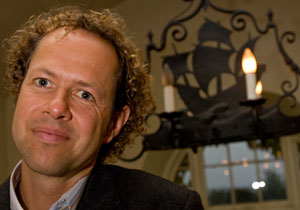 |
| Boris Worm delivered a lecture in the Great Hall of the University Club. (Bruce Bottomley Photo) |
“Is the glass half empty or half full?”
This widely known colloquialism was the question that Boris Worm posed to the faculty, students and members of the community who came to gather some insight into the current state of the world’s marine ecosystems.
A world-renowned marine ecologist and associate professor in Â鶹´«Ă˝â€™s Department of Biology, Dr. Worm presented an alarming foreshadowing of the consequences of increased human activity on marine ecology during his lecture, held Tuesday, Sept. 29 in the University Club.
So here’s the half empty part: within the past few decades the world’s oceans have seen a drastic loss of coastal biodiversity. An estimated seven per cent of marine species became extinct by the year 2000, while approximately 36 per cent of species collapsed, or in other words, having their populations decrease by up to 90 per cent.
The decrease in biodiversity carries a domino effect in the fishing industry. It leads to a decline in fisheries, nursery habitat and filter function. Invasive species, like algae blooms, also pose a threat to the health of wildlife.
Balancing the bad news with good, the pessimism with optimism, Dr. Worm illustrated the “half full” part of the current crisis by pressing for a reduction of fishing which could lead to the recovery of some species and implementing “catch shares” for fishermen, a strategy intending to prevent over-exploitation.
Common in New Zealand, Australia and Iceland, catch shares guarantee each shareholder a fixed portion of a fishery’s total allowable catch, set each year by scientists. Much like stock shares in a corporation, these shares can be bought and sold. Each share becomes more valuable when the fish population—and thus the total allowable catch—increases. With catch shares, every shareholder has a financial stake in the long-term health of the fishery.
Other proposed solutions included increasing protected wildlife areas and banning wasteful practices in commercial fishing.
And while both sides of the “half empty - half full” debate were addressed, Dr. Worm still stressed that action needs to be taken immediately to salvage the future of marine biodiversity.
Public awareness of the problem is also key.
“We all need to become engaged in raising awareness and working for solutions to conservation,” says Dr. Worm.
A leading scientist in marine ecology, Dr. Worm has published numerous papers in various journals, including Science and Nature. He currently teaches - "Introductory Ecology" and Biology 3065 - "Conservation Biology" to Â鶹´«Ă˝ undergraduate students.
Crislana Rafael is a first-year biology student at Â鶹´«Ă˝.
